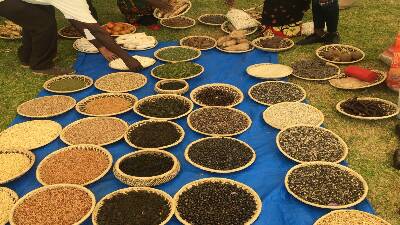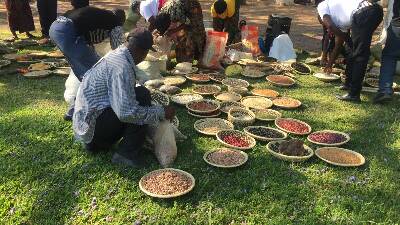Benin: Rural communities recover peasant seeds to improve nutrition and livelihoods
In recent years, government policies in Benin have incentivized peasants to shift to production of commercial crops, such as maize, for markets, rather than traditional crops for consumption, which has contributed to increased food insecurity and malnutrition.
But efforts to recover peasant seed systems are improving the livelihoods of peasants in a remote northern area.
“It’s thanks to the cowpea that this year my children did not have to work in the fields,” says Niamy Djamou, a peasant in the northern village of Tora. “When the famine [month of food shortage] came I did not have maize or anything … If we did not have the cowpea the famine would have really affected our family.”
Government programs aim to increase incomes in rural communities, yet many families have faced food shortages and malnutrition, especially in years of low harvests. The uptake of industrial seeds has resulted in the abandoning of peasants’ own seeds of traditional local crops. Many families found themselves in a situation where they had to buy their seeds every year as well as fertilizers and pesticides that are necessary to grow the hybrid, high-yielding varieties – instead of recycling their own seeds.
Organisation Rurale pour une Agriculture Durable (ORAD) has supported the villagers of Tora to recover their peasant seeds from traditional crops like sorgo and cowpea. These seeds can be re-sown every year and are constantly adapted to changing conditions, which is becoming increasingly important in the context of the impacts of climate change. Most of the villagers are peasant farmers. Selecting and re-sowing their seeds makes families more independent as they no longer have to buy seeds every year. Most importantly, recovering peasant seeds of traditional local crops has ensured sufficient food and improved nutrition for the families of Tora.
“Last year, when some of us started to grow cowpea again, people said ‘what will that bring?’ But this year, we saw the benefits,” says Euphrasie. “When the month of famine came, those who had grown cowpea had food to feed their families. Some of them even had enough to sell to others. This year we will all grow cowpea so that we can eat and have some income.”
ORAD and communities also have initiated a dialogue with mayors and other local authorities in order to make them aware of the benefits of peasant seed systems for the right to food and nutrition and rural development. Speaking with authorities is also important for local peasants because of a new threat: Benin’s neighboring country Nigeria has recently authorized field trials of genetically modified (GM) cowpea. This has raised serious concerns that GM seeds could cross the border and contaminate rural communities’ fields and seeds.
Peasants and their organizations are asking the Benin authorities to protect and support peasant seed systems and put in place policies that support agroecology.


